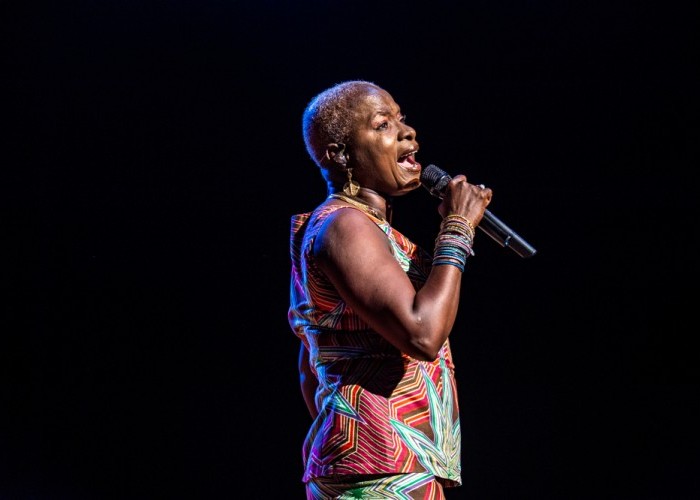Jan 13, 2026 2:09 PM
More Trump-Kennedy Center Cancellations
The fallout from the renaming of the John F. Kennedy Center for the Performing Arts to include President Donald…

Singer Angélique Kidjo performs portions of Talking Heads’ Remain In Light on Aug. 6 at Ravinia in Highland Park, Illinois.
(Photo: Russell Jenkins/Ravinia Festival)Angélique Kidjo traversed continents before she heard Talking Heads’ Remain In Light. But her Aug. 6 concert at Ravinia in Highland Park, Illinois, made it sound as if she didn’t travel far to claim these songs for herself.
The Beninese singer first listened to the New York rock group’s 1980 album around the time she immigrated to Paris in 1983. Much of it sounded familiar, as Talking Heads had layered African rhythms into the production, along with funk and some early hip-hop conceits. Territorial and spiritual journeys also inform its lyrics. Kidjo fully absorbed the album more recently and released her interpretation, also titled Remain In Light (Kravenworks). This version—sung in English, Fon and Yoruba—emphasized personal, as much as global, themes. But the new take on the 1980 recording departed from its predecessor in some pronounced ways during the recent performance.
When Talking Heads released Remain In Light, the album steered away from rock music’s prevalent spotlight on soloists. Individual instruments and David Byrne’s voice became subsumed by the rhythmic changes and ensemble dynamic. But when Kidjo sings, her powerful tone and magnetic charisma are never far from the focus. That was especially clear at Ravinia, but her star power also came through as an array of musical ideas framed her voice.
Her determined delivery and the accompanying quintet’s versatility drove the opening “Born Under Punches.” Kidjo’s urgency projected strength without letting amplification drown out percussionist Edgardo “Yayo” Serka and drummer Magatte Sow’s shifting accents. Meanwhile on that piece, as well as “Crosseyed And Painless,” guitarist Dominic James and bassist Michael Olatuja responded to Kidjo with interlocking lines that recalled West African highlife.
As the singer’s performance added more empathy to the narration of “Listening Wind,” Serka’s mallets pushed her forward, as if he echoed a nervous heartbeat in this song about a terrorist attack. Similarly, keyboardist Jason Lindner revealed continuously shifting effects as Kidjo free-associated a rap on “Houses In Motion.”
Some songs felt as if they were composed with Kidjo in mind, but here, too, she emphasized her group as much as herself. Singing “The world moves on a woman’s hips” (from “The Great Curve”), her movements directed the band, especially Serka’s talking drum and Linder’s synthesizer lines, which resembled those of the late Talking Heads associate Bernie Worrell. Kidjo also took on a ministerial role for “Once In A Lifetime,” as the group’s upbeat response stressed the universal and she repeated the pronoun “you.”
When Kidjo departed from Remain In Light, just a few songs highlighted her wide vocal and emotional range. Kidjo performed her haunting “Cauri” with just James’ guitar accompaniment, as the song decries the worldwide abuse of young girls. Later on, she paid tribute to the late Miriam Makeba (calling the South African hero “my musical mother”) in a frenzied version of her 1960s hit “Pata Pata.”
Kidjo went back to the Talking Heads songbook for her encore, a cool delivery of the group’s “Burning Down The House” (from the 1983 album Speaking In Tongues). As the song itself compelled the audience to dance while Lindner made the most of his laptop’s sound effects, she kept her vocal delivery mostly understated. That framework made her sudden shout, on the line “fighting fire with fire,” all the more striking and, ultimately, joyous.
Nigerian Afrobeat bandleader Femi Kuti’s opening set presented a similar spirit. His group, Positive Force, reflects the musical legacy of Femi’s father, Fela Kuti. A full horn section responded to keyboard vamps and interlocking polyrhythms. Just like in the ’70s and ’80s, the voices and choreography of backing female vocalists added their own commentary. The bandleader also continued the tradition of using his performance to critique global crises—at Ravinia he decried war, climate change and the plight of refugees. Fela Kuti was frequently a caustic figure onstage, but at Ravinia, Femi Kuti sounded genial while singing or playing elongated lines on alto saxophone. And his reach for a musical mantle never veered far from that gentle touch. DB

Belá Fleck during an interview with Fredrika Whitfield on CNN.
Jan 13, 2026 2:09 PM
The fallout from the renaming of the John F. Kennedy Center for the Performing Arts to include President Donald…

Peplowski first came to prominence in legacy swing bands, including the final iteration of the Benny Goodman Orchestra, before beginning a solo career in the late 1980s.
Feb 3, 2026 12:10 AM
Ken Peplowski, a clarinetist and tenor saxophonist who straddled the worlds of traditional and modern jazz, died Feb. 2…

The success of Oregon’s first album, 1971’s Music Of Another Present Era, allowed Towner to establish a solo career.
Jan 19, 2026 5:02 PM
Ralph Towner, a guitarist and composer who blended multiple genres, including jazz — and throughout them all remained…

Rico’s Anti-Microbial Instrument Swab
Jan 19, 2026 2:48 PM
With this year’s NAMM Show right around the corner, we can look forward to plenty of new and innovative instruments…

Richie Beirach was particularly renowned for his approach to chromatic harmony, which he used to improvise reharmonizations of originals and standards.
Jan 27, 2026 11:19 AM
Richie Beirach, a pianist and composer who channeled a knowledge of modern classical music into his jazz practice,…